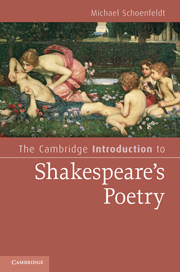Book contents
- Frontmatter
- Contents
- Acknowledgments
- Chapter 1 Shakespeare and English poetry
- Chapter 2 Shakespeare's banquet of sense
- Chapter 3 Constraint and complaint in Lucrece
- Chapter 4 Mysteries of the Sonnets
- Chapter 5 Time and mortality in the Sonnets
- Chapter 6 Friendship and love, darkness and lust
- Chapter 7 Solitary and mutual flames
- Chapter 8 Fantasies of Shakespearean authorship
- Notes
- Further reading
- Index
- Cambridge Introductions to Literature
Chapter 3 - Constraint and complaint in Lucrece
Published online by Cambridge University Press: 05 June 2012
- Frontmatter
- Contents
- Acknowledgments
- Chapter 1 Shakespeare and English poetry
- Chapter 2 Shakespeare's banquet of sense
- Chapter 3 Constraint and complaint in Lucrece
- Chapter 4 Mysteries of the Sonnets
- Chapter 5 Time and mortality in the Sonnets
- Chapter 6 Friendship and love, darkness and lust
- Chapter 7 Solitary and mutual flames
- Chapter 8 Fantasies of Shakespearean authorship
- Notes
- Further reading
- Index
- Cambridge Introductions to Literature
Summary
Short of homicide, rape is the ultimate violation of self.
– Byron R. WhiteIf Venus and Adonis features the gorgeous compulsions of pleasure, Lucrece turns its attentions to the destructive power of lust. The poem shows in sometimes lugubrious detail how uncontrolled desire destroys both its subject and its object. Fascinated by motive and consequence, the poem is deadly serious in its rigorous exploration of the connections between personal discipline and public government. The final word in the next-to-last line of the poem is “consent,” and the poem is designed to explore the connections between political and sexual consent. Political tyranny, the poem suggests, manifests itself most clearly in the predatory and willful action of rape. In fact, Shakespeare includes an “Argument” as an introduction to the poem, to be sure that the reader does not miss the larger trajectory of the story. At the end of the poem, indignation about the rape performed by a member of the royal family leads to the establishment of the Roman republic. As the Argument relates, Brutus offers “a bitter invective against the tyranny of the king: wherewith the people were so moved, that with one consent and a general acclamation the Tarquins were all exiled, and the state government changed from kings to consuls.” Rarely has the personal been so closely and overtly allied to the political.
Like Venus, the poem is dedicated to the earl of Southampton.
- Type
- Chapter
- Information
- The Cambridge Introduction to Shakespeare's Poetry , pp. 38 - 56Publisher: Cambridge University PressPrint publication year: 2010



